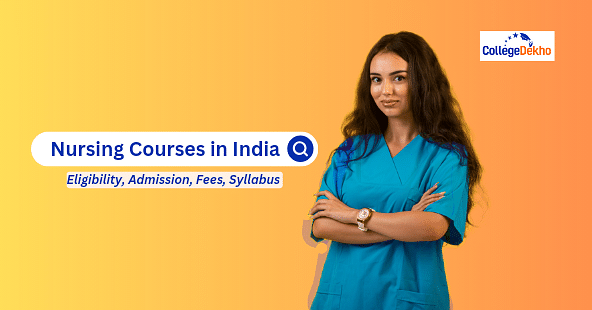Nursing courses in India include courses like BSc Nursing, BSc Nursing (Hons.), Post-Basic BSc Nursing, MSc Nursing, and diploma programs like ANM, GNM for a duration of 1 to 4 years. Check details here!
- Why Choose Nursing Courses?
- Types of Nursing Courses in India
- List of Nursing Courses in India After 12th
- Nursing Courses Eligibility Criteria
- Nursing Courses Entrance Exams in India
- Diploma Courses in Nursing
- Post-Basic Diploma Courses in Nursing
- Nursing Course Online
- Postgraduate Nursing Courses in India
- Eligibility Criteria for Postgraduate Degree Nursing Course
- Eligibility Criteria for Postgraduate Diploma Courses in Nursing
- Scope of Nursing Courses in India
- Nursing Course Salary
- Nursing Courses Top Recruiters
- Top Nursing Colleges in India
- Faqs

Nursing Courses in India are offered to eligible students through entrance exams, such as NEET UG, AIIMS BSc Nursing, JENPAS UG, AIIMS MSc Nursing Exam, AIIMS BSc Nursing Exam, etc., conducted at both the National and State levels. The Nursing Courses in India are categorized under three types, namely, Certificate, Diploma, and Degree courses. Some of the popular nursing courses are the BSc Nursing , MSc Nursing, Diploma in Nursing , Post Basic B.Sc Nursing, etc. AIIMS Delhi, Armed Forces Medical College, National Institute of Mental Health & Neuro Sciences, and B.M. Birla College of Nursing are considered some of the best Nursing institutions in India, offering admission to interested students. Microbiology, Child Health Nursing, Physiology, Nursing Foundations, Nutrition, etc., are some of the core subjects taught in Nursing courses in India.
The total duration of the Nursing Courses in India across the top nursing colleges in India usually varies from 6 months to 4 years, depending on the course type. To be eligible for Nursing Courses admission in India, students must have completed their 10+2 from a recognized educational institution, with a Science background and a minimum of 50% marks in aggregate. The average course fee for Nursing Courses in India ranges between INR 20,000 to INR 2 LPA. After completing desired Nursing Courses in India, students can opt for a career in the field as a Chief Nursing Officer, Nurse Educator, Critical Care Nurse, Clinical Nurse Manager, or Registered Nurse. Read the following article provided below to know more about the Nursing Courses in India in detail
Also read: Full Form of Different Medical and Nursing Courses
Why Choose Nursing Courses?
Nursing Course is one of the most sought-after courses in India. Students have to pass a higher secondary degree in the science stream. Professional graduates of the list of nursing courses are trained to work in clinics, hospitals, and nursing homes. The average course fee for Nursing courses in India ranges from Rs. 20,000 to Rs. 2,00,000 per annum. With the constant rise in the healthcare industry, the demand for nursing jobs is increasing. Before discussing more, let us discuss about benefits of choosing nursing courses.
Essential Healthcare Role : Nursing courses in India are the backbone of healthcare. It provides vital support to patients emotionally and physically. The responsibilities of a nurse include administering medication, providing therapies, and offering comfort to patients and their families
Diverse Career Paths : Completing nursing courses opens up diverse career avenues, including community care, hospitals, public health organizations, and long-term care facilities. With a bachelor's degree typically lasting four years, graduates have numerous career options.
Promising Future : All nursing courses offer a financially secure and promising future. With various educational paths, including certificates, diplomas, undergraduate, and postgraduate degrees, nursing provides a gateway to a bright and rewarding career.
Also Read: Top BSc Nursing Colleges
Types of Nursing Courses in India
There are mainly three types of Nursing Courses in India: Degree, Diploma, and Certificate nursing courses. The choice among these three depends on the career requirements of the student. Explore the average fees, course duration, and other details regarding these three types of Nursing Courses in India.
Course Type | Duration | Average Course Fee | Details |
|---|---|---|---|
Degree Nursing Courses | 2 years to 4 years | Rs. 20,000 to Rs. 1.5 LPA | The degree courses in Nursing are offered at both, UG as well as PG levels. Students can pursue degree courses in Nursing after completing higher secondary with at least 50% marks in aggregate. Bsc nursing falls under this section. |
Diploma Nursing Courses | 1 year to 2.5 years | Rs. 15,000 to Rs. 80,000 | Like degree courses, Diploma courses in Nursing are also offered at UG, as well as, PG level. Students can apply for a diploma in nursing courses after completing the secondary degree with 50% marks in aggregate. |
Certificate Nursing Programmes | 6 months to 1 year | Rs. 3,000 to Rs. 35,000 | Certificate courses in Nursing are usually offered at the undergraduate level. These courses are usually taken by professionals to upskill their knowledge. |
List of Nursing Courses in India After 12th
Candidates have a wide range of alternative Nursing courses to select from at the undergraduate level, including several specializations and types of Nursing courses. Aspirants can choose between a Nursing degree and a certificate or diploma course, based on their preferences. Students who wish to pursue Nursing courses in India after 12th can apply for a wide range of undergraduate and diploma degrees. The list of nursing courses at the UG or PG level has been provided below for prospective students to review.
Undergraduate Degree Courses in Nursing
Course Name | Nursing Course Duration | UG Nursing Course Fee |
|---|---|---|
BSc Nursing | 4 Years | Rs. 20,000 - Rs. 2.5 LPA |
BSc Nursing (Hons.) | 2 Years | Rs. 40,000 - Rs. 1.75 LPA |
2 Years | Rs. 40,000 - Rs. 1.75 LPA | |
BSc Nursing (Post Certificate) | 2 Years | Rs. 40,000 - Rs. 1.75 LPA |
Certificate and Diploma Nursing Courses
Students can pursue a certificate or diploma in Nursing Courses to enter the paramedical field in less time. The course duration of Undergraduate Certificate or Diploma Courses in Nursing can start from 6 months and go up to 3 years. Also, the Nursing Course fees for Diplomas and Certificates are comparatively lower in comparison to regular UG or PG Nursing Degree courses. Refer to the table below to know more about the certificate or diploma nursing courses offered in India.
Course Name | Nursing Course Duration | Nursing Courses Fees |
|---|---|---|
2 Years | Rs. 10,000 - Rs. 60,000 | |
3 years - 3.5 years | Rs. 20,000 - 1.5 LPA | |
Advanced Diploma in Ophthalmic Care Management | 2 Years | Rs. 10,000 - Rs. 2 LPA |
Diploma in Home Nursing | 1 Year | Rs. 20,000 - Rs. 90,000 |
Diploma in Emergency and Trauma Care Technician | 2 Years | Rs. 20,000 - Rs. 90,000 |
Diploma in Nursing Administration | 3 Years | Rs. 20,000 - Rs. 90,000 |
Diploma in Neuro Nursing course | 2 Years | Rs. 20,000 - Rs. 90,000 |
Diploma in Health Assistant (DHA) | 1 Year | Rs. 20,000 - Rs. 90,000 |
Certificate course in Ayurvedic Nursing | 1 Year | Rs. 20,000 - Rs. 90,000 |
Certificate in Home Nursing course | 1 Year | Rs. 20,000 - Rs. 90,000 |
Certificate in Maternal and Child Health Care (CMCHC) | 6 Months | -- |
Certificate in Care Waste Management (CHCWM) | 6 Months | -- |
Certificate in Primary Nursing Management (CPNM) | 1 Year | Rs. 20,000 - Rs. 90,000 |
1-Year Duration Nursing Courses in India
Candidates who have completed a Diploma in Nursing, BSc Nursing, or BSc Nursing Post Basic are eligible to pursue a 1-year nursing course in India at the post-basic diploma level. Additionally, students are required to have a minimum of 1 year of work experience in the same field. Here is a list of 1-year nursing courses available for reference.
- Post Basic Diploma in Operating Room Nursing
- Post Basic Diploma in Neonatal Nursing
- Post Basic Diploma in Critical Care Nursing
- Post Basic Diploma in Cardio Thoracic Nursing
- Post Basic Diploma in Emergency & Disaster Nursing
- Post Basic Diploma in Emergency and Disaster Nursing
- Post Basic Diploma in Critical Care Nursing
- Post Basic Diploma in Neonatal Nursing
- Post Basic Diploma in Cardiothoracic Nursing
- Post Basic Diploma in Oncology Nursing
- Post Basic Diploma in Renal Nursing
- Post Basic Diploma in Neurology Nursing
- Post Basic Diploma in Psychiatric Nursing
- Post Basic Diploma in Operating Room Nursing
- Post Basic Diploma in Orthopaedic & Rehabilitation Nursing
- Post Basic Diploma in Geriatric Nursing
- Post Basic Diploma in Burns Nursing
These specialized courses provide advanced training and knowledge in specific areas of nursing, allowing healthcare professionals to enhance their skills and contribute effectively in their respective fields.
6-month Nursing Course in India
A 6 month nursing course in India is ideally offered only as a certification programme. The 6-month Nursing courses are mostly considered as upskilling courses. Here are some of the colleges as well as online platforms offering a 6-month nursing course in India.
Refer below to the list of 6-month nursing courses in India.
- Certificate in Maternal and Child Health Nursing (CMCHN)
- Certificate in Maternity Nursing Assistant (CTBA)
- Certificate Course in Home-based Health Care
- Advanced Certificate in Nursing Administration
- Certificate in Baby Nursing and Child Care
The eligibility criteria for the 1-year nursing course and the 6-month nursing course in India vary from one institution to another.
Nursing Courses Eligibility Criteria
Students are required to pass 10+2 with science stream and score the college cutoff scores to get admission in Nursing courses taught in nursing colleges. Every course has a specific eligibility criteria and student are required to meet the eligibility criteria for admissions to these courses. Below given in details is the course-wise eligibility criteria.
ANM Course
Auxiliary Nursing Midwifery (ANM) courses at the nursing colleges are taught for two years and it focuses on providing basic nursing care to individuals, families, and communities. Students can find the detailed eligibility criteria under ANM courses given below.| Course | Criteria | Details |
|---|---|---|
| ANM Courses | Minimum Age Criteria | Candidates must be 17 years of age on or before 31st December of the year in which they are willing to take admission, to satisfy the minimum age requirement for A.N.M. registration |
Upper Age Limit | The upper age limit as set by the concerned authority is 35 years for admission to A.N.M courses | |
PCMB as Core Subject | All candidates must have passed their 10+2 or equivalent with Mathematics, Physics, Chemistry, Biology, and English Elective from a recognized Board/Institution | |
Physically and Mentally Fit | All candidates should be medically fit to be eligible for admission to A.N.M courses. | |
Annual A.N.M. Exams | Candidates can appear for A.N.M. Entrance Exams only once a year. |
GNM Course
General Nursing and Midwifery or GNM Nursing is a diploma course. Students applying for the entrance exams must be physically and mentally fit. Apart from this, there are other eligibility criteria set by the exam conducting bodies, check out the table below to know the eligibility criteria for the GNM Nursing Course.| Course | Criteria | Details |
|---|---|---|
| GNM Courses | Minimum 40% marks in Class 12th | All candidates must have passed their 10+2 or equivalent with a Science background and English as their core subject, and a minimum of 40% at the qualifying examination from a recognized board |
Educational Requirement for Foreign Nationals | For foreign nationals, the minimum educational qualification is 10+2 or equivalent obtained from the Association of Indian Universities, New Delhi. | |
Annual G.N.M. Exams | Candidates can appear for G.N.M. Entrance Exams only once a year | |
Physically and Mentally Fit | All candidates are required to be medically fit to be eligible for admission to G.N.M. courses | |
Minimum Age Limit | The minimum age criteria for admission is 17 years as of the 31st December of the year of admission | |
Maximum Age Limit | The upper age limit for the same is 35 years |
BSc Nursing
The minimum age required to pursue BSc Nursing Courses in India is 17 years. Similar to the subjects required of all types of nursing courses, students must have Physics, Chemistry and Biology as their core subjects in the class 12 board examination. For more information on the Eligibility Criteria for BSc Nursing Course, check out the table given below.Particulars | Details |
|---|---|
Age Criteria | The minimum age requirement to be eligible for admission to B.Sc. Nursing courses are 17 years as of 31st December of the year of admission |
PCMB as Core Subjects with Minimum 45% Marks | All candidates must have passed their 10+2 or equivalent with Science (Physics, Chemistry, Biology) & English with an aggregate of 45% marks from a recognized board. |
Physically and Mentally Fit | All candidates must be medically fit to be eligible for admission to B.Sc. Nursing course. |
Post-Basic BSc Nursing
Post Basic B.Sc. Nursing (PB-B.Sc.) is a 2 year undergraduate degree course. Students who have completed their diploma or certificate course in Nursing are eligible to apply for admission into Post-Basic BSc Nursing.Particulars | Details |
|---|---|
Class 12th from a Recognized Board | All candidates must have passed their 10+2 or equivalent from a recognized Board/Institution |
Eligibility for Post Basic B.Sc. Nursing | Candidates who have obtained a certificate in General Nursing and Midwifery, and have been registered as R.N.R.M. with the State Nurses Registration Council are eligible for admission to Post Basic B.Sc. Nursing |
Physically and Mentally Fit | All candidates must be medically fit to be eligible for admission |
Annual Exams | Candidates can appear for Post Basic B.Sc. Nursing Entrance Exams are only once a year |
MSc Nursing
Candidates must complete a Bachelor in Nursing before applying for the MSc Nursing Course. The table mentioned below consists of the eligibility criteria required to enrol in MSc Nursing course in India.Particulars | Details |
|---|---|
Eligibility for Registered Nurse | The candidate should be a Registered Nurse and Registered midwife or equivalent with any State Nursing Registration Council |
Only for B.Sc or Post Basic Nursing Candidates | All candidates must have completed their degree in B.Sc. Nursing or Post Basic B.Sc. Nursing to be eligible for admission to M.Sc. Nursing courses |
Minimum 55% Aggregates | All candidates must have secured a minimum of 55% aggregate marks in their qualifying examination |
Minimum 1 Year Work Experience | All candidates must have at least one year of work experience prior to or after Post Basic B.Sc. Nursing. |
Nursing Courses Entrance Exams in India
Students will have to appear for various nursing entrance exams in India to get admission in Nursing programs. Mentioned below are the important nursing entrance exams in India that students will have to clear for admissions to nursing programs.
Exam Name | Date |
|---|---|
BSc (H) Nursing: June 1, 2025
| |
NEET UG Exam | May 4, 2025 |
JEMScN | July 13, 2025 |
JENPAS UG | May 25, 2025 |
RUHS Nursing | August 2025 |
July 12, 2025 | |
Telangana MSc Nursing Exam | June 2025 |
CMC Ludhiana BSc Nursing Exam | June 2025 |
PGIMER Nursing | July 2025 |
HPU MSc Nursing Exam | July 2025 |
Diploma Courses in Nursing
Diploma courses in nursing aim to provide the candidates with the general nursing skills that will prepare them for different roles in healthcare and allied fields. Apart from the general diploma in nursing course, ANM and GNM are the most pursued nursing diploma courses. The candidates can check different diploma courses in the following table along with the course duration and average fees.
GNM Nursing | 3 years | 50,000 - 1,00,000 |
|---|---|---|
Course | Duration | Average Fees (Rs.) |
ANM Nursing | 2 years | 35,000 - 88,000 |
Diploma in Nursing | 3 years | 20,000 - 90,000 |
Diploma in Home Nursing | 2 years | 20,000 - 1,00,000 |
Diploma in Nursing Administration | 1 year | 42,000 |
Post Graduate Diploma in Neonatal Nursing | 1 year | 40,000 |
Read More: List of Nursing After 10th
Post-Basic Diploma Courses in Nursing
In various course specializations, the Diploma courses are also offered as post-basic diplomas to the candidates willing to pursue higher studies in medical field. These courses focus on providing advanced knowledge and skillset to already working nurses in variou shospitals/clinincs. These courses are short term courses providing impetus to career and job designation after completion. The candidates willing to pursue post-basic diploma course in Nursing can check some of the top post-basic diploma courses in the table below along with the course duration and average salary:
Course Name | Course Duration | Average Salary (Rs.) |
|---|---|---|
Post Basic Diploma in Operation Room Nursing | 1 year | 35,000 |
Post Basic Diploma in Cardio Thoracic Nursing | 1 year | 13,000 |
Post Basic Diploma in Critical Care Nursing | 1 year | 35,000 |
Post Basic Diploma in Emergency and Disaster Nursing | 1 year | 35,000 |
Post Basic Diploma in Neonatal Nursing | 1 year | – |
Post Basic Diploma in Neurology Nursing | 1 year | 10,000 - 12,000 |
Post Basic Diploma in Oncology Nursing | 1 year | 50,000 |
Post Basic Diploma in Psychiatric Nursing | 1 year | – |
Post Basic Diploma in Rehabilitation Nursing | 1 year | 10,000 - 12,000 |
Post Basic Diploma in Geriatric Nursing | 1 year | 60,000 |
Post Basic Diploma in Renal Nursing | 1 year | – |
Post Basic Diploma in Burn and Reconstructive Surgery Nursing | 1 year | 10,000 - 12,000 |
Nursing Course Online
Apart from the 1 year nursing course and 6-month nursing course in India, there are several specializations and programmes available online. Aspirants who are unable to join the regular BSc nursing or other nursing courses can opt for this option. Here are some of the details mentioned regarding online nursing courses.
Course Name | Duration | Platform | Nursing Course Fees |
|---|---|---|---|
Certificate in Essentials of Cardiology | 3 months Nursing Course | Medvarsity | Rs. 30,000 |
Healthcare Administration | 7 months Nursing Course | edX | Rs. 1 LPA |
Disaster Medicine Training | 8 weeks Nursing Course | edX | Free (Certificate for Rs. 3,706) |
Certificate in Wellness Coaching | 2 months Nursing Course | Medvarsity | Rs. 20,000 |
Masterclass in Medical Emergencies | 6 months Nursing Course | Medvarsity | Rs. 33,800 |
Postgraduate Nursing Courses in India
Just like UG Nursing course, postgraduate Nursing courses in India also have a variety of options not only in specialisations but also in course types. As per your preference, you can either go for a PGD (Post Graduate Diploma) in Nursing or a PG degree course in Nursing. Both types of courses are mentioned below.
Postgraduate Degree Courses in Nursing
Mentioned below is a list of PG degree courses in Nursing along with their fee details.
Course Name | Duration | Nursing Courses Fees |
|---|---|---|
MSc Nursing | 2 Years | Rs. 1.30 LPA - Rs. 3.80 LPA |
M Sc in Child Health Nursing | 2 Years | Rs. 1.30 LPA - Rs. 3.80 LPA |
M Sc in Community Health Nursing | 2 Years | Rs. 1.30 LPA - Rs. 3.80 LPA |
M Sc in Medical-Surgical Nursing | 2 Years | Rs. 1.30 LPA - Rs. 3.80 LPA |
M Sc in Maternity Nursing | 2 Years | Rs. 1.30 LPA - Rs. 3.80 LPA |
M Sc in Paediatric Nursing | 2 Years | Rs. 1.30 LPA - Rs. 3.80 LPA |
M Sc in Obstetrics and Gynecological Nursing | 2 Years | Rs. 1.30 LPA - Rs. 3.80 LPA |
M Sc in Psychiatric Nursing | 2 Years | Rs. 1.30 LPA - Rs. 3.80 LPA |
M D (Midwifery) | 2 Years | -- |
PhD (Nursing) | 2 - 5 Years | -- |
M Phil Nursing | 1 Year (Full Time) 2 Years (Part-Time) | -- |
Postgraduate Diploma Courses in Nursing
Other than the degree courses, you can prefer any of the following Postgraduate Diploma courses in Nursing.
Course Name | Duration | Nursing Courses Fees |
|---|---|---|
Post Basic Diploma in Critical Care Nursing | 1 Year | Rs. 20,000 - Rs. 50,000 |
Post Basic Diploma in Orthopedic & Rehabilitation Nursing | 1 Year | Rs. 20,000 - Rs. 50,000 |
Post Basic Diploma in Operation Room Nursing | 1 Year | Rs. 20,000 - Rs. 50,000 |
Post Graduate Diploma in Paediatric Critical Care Nursing | 1 Year | Rs. 20,000 - Rs. 50,000 |
Post Basic Diploma in Ontological Nursing and Rehabilitation Nursing | 1 Year | Rs. 20,000 - Rs. 50,000 |
Post Graduate Diploma in Neo-Natal Nursing | 1 Year | Rs. 20,000 - Rs. 50,000 |
Post Graduate Diploma in Emergency Nursing | 1 Year | Rs. 20,000 - Rs. 50,000 |
Also Read:
Eligibility Criteria for Postgraduate Degree Nursing Course
- To get admission in M Sc Nursing course , you must hold a B Sc Nursing degree or equivalent from a recognised university.
- For PhD courses, you must have completed a Master’s degree in the relevant field.
- You will be required to crack an entrance exam as most of the colleges conduct admission through exams only.
Eligibility Criteria for Postgraduate Diploma Courses in Nursing
- In order to get admission in PGD courses in Nursing, you are required to have completed a graduate degree in Nursing or a relevant specialisation.
- Some courses or colleges may require you to have prior work experience in this field.
Also read: List of nursing courses exams in India
Scope of Nursing Courses in India
The scope of Nursing Courses is increasing every year. Hence, the job prospects for professional graduates of nursing courses are rising. The scope of nursing courses in India includes abundant job opportunities, guaranteed employment, steady work-life balance, and scope for learning and growth. A detailed discussion regarding the Scope of Nursing Courses in India is presented below.
- Flourishing Career: Nursing in India offers a highly promising future and a flourishing career path. Graduates can also find employment in government hospitals, old age homes, sanatoriums, clinics, and various other healthcare settings.
- Abundant Opportunities: Nursing graduates in India have a lot of opportunities after completing 1 1-year nursing course, 6-month nursing courses, UG, and PG nursing programs. A career in nursing surely offers diverse career paths to students.
- Guaranteed Employment: Nursing professionals in India do not face uncertainty in the future.
- Salary and Income Growth: In reputable healthcare organizations, fresh nursing graduates can earn up to 80,000 Rs. initially at the beginning of their career. With time, the salary is increased.
- Continuous Learning and Growth: Nursing courses in India or any other country offer a continuous learning environment, allowing all professionals to enhance their skills and knowledge throughout their careers.
Some of the popular companies offering jobs to students of Nursing courses are Apollo Hospitals, Government Healthcare Sectors, Fortis Hospitals, Ayurvedic Medical Treatment Hospitals, and Columbia Asia Hospitals. Interested students can refer to the pointers below to learn in detail about the several job scope after passing nursing course in India.
- Chief Nursing Officer
- Nurse Educator
- Critical Care Nurse
- Clinical Nurse Manager
- Registered Nurse
Nursing Course Salary
The nursing course salaries for freshers and experienced ones differ, depending on the job role one takes up. Given below are some of the salary structures that graduates from nursing course in India can rake in.
Types of Nurses and Salaries
Job Profile | Salary (per month) |
|---|---|
AIIMS Nursing Officer Salary/ Nursing Officer Salary | Rs. 9,300 – 34,800 |
Staff Nurse Salary | Rs. 23,892 |
GNM Nursing Salary | Rs. 10,000- 15,000 |
Nurse Practitioner Salary | Rs. 2,70,000 per annum |
ANM Nursing Salary | Rs. 20,000 – 25,000 |
Nursing Supervisor Salary | Rs. 18,000 - 30,000 |
Military Nursing Salary | Rs. 15,000 – 20,000 |
AIIMS Nurse Salary | Rs. 9,300 – 34,800 |
MSc Nursing Salary | Rs. 35,000 – 75,000 |
BSc Nursing Salary
After completing the BSc Nursing course, the salary offered to nurses is determined based on the type of hospital they are employed at, and the years of experience of the candidates. Aspirants completing 1 year nursing course and 6-month nursing course in India also bag lucrative packages. The table below comprises crucial highlights that indicate some of the key parameters one must know about salary.
Parameters | Average Salary |
|---|---|
USA | Rs. 1,459 per hour |
Australia | Rs. 1,770 per month |
Average Salary | Rs. 3,00,000 – 7,50,000 per annum |
UK | Rs. 23,08,797 per month |
AIIMS | Rs. 3,60,000 – 4,60,000 per annum |
Germany | Rs. 25,33,863 per month |
Government Sector | Rs. 25,000 per month |
Canada | Rs. 1,989 per hour |
Nursing Courses Top Recruiters
Fortis Hospitals, Apollo Hospitals, Medanta, and various government hospitals stand out as the top recruiters for nursing graduates across all courses. Whether one holds an ANM certificate or an MSc in Nursing, opportunities abound in these esteemed institutions. Explore the comprehensive list of top recruiters for nursing graduates in India to kickstart your career journey.
Government Hospitals | Fortis Hospitals |
|---|---|
Ramaiah Group of Hospitals | Apollo Hospitals |
Medanta | Ayurvedic Medical Treatment Hospitals |
AIIMS | Columbia Asia Hospitals |
PGIMER | CMC |
Top Nursing Colleges in India
In India, many colleges provide 6-month, 1-year, and even 4-year nursing courses. Students can select several courses based on their goals and areas of interest in learning. Check out the tables listed below to know the names of Top Nursing Colleges in Delhi, Mumbai and Chennai.
Top Nursing Colleges in Delhi
Jamia Milia Hamdard is one the most renowned universities that offer BSc (Hons.) Nursing. Check out the list of other Top Nursing Colleges in Delhi along with their average course fee for Nursing programmes.College Name | Course Fee (Approx.) |
|---|---|
- | |
Rs. 7,360 per year | |
Rs. 1,685 per year | |
Rs. 1,40,000 per year | |
Ahilya Bai College of Nursing, New Delhi | Rs. 5,690 per year |
Top Nursing Colleges in Mumbai
The nursing courses list includes BSc Nursing, ANM, GNM, Diploma in Home nursing, etc. All of these nursing courses are offered in the Nursing colleges situated in Mumbai. Check out the list of top nursing colleges in Mumbai along with their average course fee.College Name | Course Fee (Approx.) |
|---|---|
- | |
- | |
Rs. 50,000 – Rs. 1,50,000 | |
Shreemati Nathibai Damodar Thackersey Women's University, Mumbai | Rs. 92,805 per year |
Top Nursing Colleges in Chennai
Mentioned below are the top Nursing Colleges in Chennai. These colleges offer all nursing courses, from BSc to MSc. Check out the average course fee and names of Chennai's top nursing colleges.College Name | Course Fee (Approx.) |
|---|---|
The Tamil Nadu Dr. M.G.R. Medical University | Rs. 6,000 |
- | |
Faculty of Nursing - SRIHER Chennai | Rs. 75,000 – Rs. 1,00,000 |
Bharath University, Chennai | - |
Nursing Courses in India offer a variety of career opportunities for each graduate. There are 3 types of nursing courses, which include BSc Nursing, MSc Nursing, and other diploma courses such as ANM, GNM, and Diploma in Home Nursing. Depending on career aspirations and educational background, students can choose the course that best suits their needs. With durations ranging from 6 months to 4 years and fees spanning from Rs. 3,000 to Rs. 1,50,000 LPA, there are many nursing courses in India for everyone. Entrance exams like AIIMS BSc Nursing Exam and JENPAS UG open doors to prestigious Medical institutions. Nursing graduates can embark on fulfilling careers as Chief Nursing Officers, Nurse Educators, and more. The highest-paying nursing job role in India is of an MSc Nursing graduate. Hence, BSc Nursing graduates can enroll into MSc Nursing courses for a better in-hand salary
Are you feeling lost and unsure about what career path to take after completing 12th standard?
Say goodbye to confusion and hello to a bright future!

FAQs
The eligibility criteria for BSc Nurisng courses are as follows. Candidates need to have completed 10+2 with Physics, Chemistry, and Biology to enrol in Nursing Courses in India. Some institutions may specify a minimum aggregate percentage, and entrance exams like NEET are often required for admission.
India offers a range of nursing courses catering to diverse career paths. Common types include Bachelor of Science in Nursing (BSc Nursing), General Nursing and Midwifery (GNM), Auxiliary Nurse Midwife (ANM), and various specialized postgraduate programs like MSc Nursing and Post Basic BSc Nursing.
There are mainly 3 types of nursing courses in India. Following are the types of courses
1. Degree Nursing Courses
2. Diploma Nursing Courses
3. Certificate Nursing Courses
Yes, there are many scholarships available for nursing students. Both, government and private scholarships are available for students enrolled in Pharamcy Courses. Students can apply for scholarships offered by the government, private institutions, and charitable organizations from their respective official websites.
Yes, nursing professionals can engage in research activities in collaboration with healthcare institutions, universities, and research organizations to contribute to the advancement of nursing science and healthcare practices in India.
The best Nursing course after 12th is BSc nursing. Owing to numerous job opportunities & brigh career prospects, BSc nursing is the top choice of students.
Yes, aspirants from Arts and Commerce stream can pursue nursing courses like ANM and GNM. To study ANM and GNM Nursing, candidates should have qualified 10+2 with English as a compulsory subject.
No, Nursing courses are not difficult to learn. As long as aspirants have the grit and passion, anything is possible.
The average fee for a BSc Nursing course ranges between INR 10,000 - INR 2,00,000 per annum. It depends which type of college one chooses to study at.
To secure admission to Government College for BSc Nursing, an applicant must score around 300 - 500 marks in NEET UG 2024.
Different subjects are taught to candidates based on which nursing course one opts for. In general, these are the important syllabus concepts that are covered - Anatomy, Nutrition, Biochemistry, Physiology, Microbiology, Pharmacology, etc.
Was this article helpful?





















Similar Articles
Government Jobs After ANM Nursing: Salary, Entrance Exams
Rajasthan GNM Admissions 2026: Dates, Application, Eligibility, Selection Process
Complete Admission Guide for BSc Nursing in Northeast India
Best College Options in Punjab for BSc Nursing
Can a BSc Nursing Graduate Join the Indian Defense Forces?
Distance Learning Options for BSc Nursing in India 2026